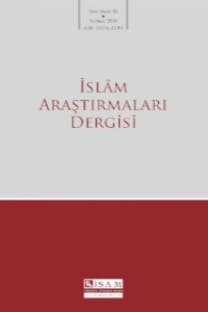VII. / XIII. Yüzyıl İslâm Düşüncesinde Fahreddin Râzî Ekolü
Fahreddin Râzî’yi felsefe, dar anlamda metafizik ile kelâm sahasında bir sentez döneminin müessisi olarak görmek mümkündür ve onun yaklaşımı, somut bir şekilde el-Muhassal gibi bazı eserlerinin ismine de yansımıştır. Mantığı nazarî ilimlerin temeli olarak gören Râzî, doğa bilimleri ve metafiziğin meselelerini yeni bir içerikle ve daha sistematik bir üslûpla ele almıştır. O kelâm ve felsefede mütekellimîn ve filozofların delillerini karşılıklı olarak serdeden, açıklayan bir yaklaşıma sahiptir. Râzî’nin yaklaşımı, öğrencileri ve daha sonraki dönemlerde de takipçileri tarafından sürdürülmüştür. VII./XIII. yüzyıldan itibaren Râzî’nin takipçileri ve öğrencilerinden güçlü bir şekilde bahsedilmesi, İbnü’l-İbrî, İbn Hallikân, İbnü’l-Mutahhar el-Hillî ve İbn Haldûn gibi tarihçi ve mütefekkirlerin bu tabirleri kullanması Fahreddin Râzî’nin etkili konumuna işaret etmektedir. Bu çalışmada Fahreddin Râzî’nin bilhassa XIII. yüzyılda, yöntemi ve yaklaşımını devam ettiren isimleri “Râzî ekolü” tabiri etrafında irdeleyeceğiz ve bu kavramı felsefe ve kelâm tarihi ile literatürü bağlamında temellendirmeye çalışacağız.
Anahtar Kelimeler:
Fahreddin Râzî, Râzî ekolü, İslâm düşüncesi tarihi, Osmanlı öncesi nazarî düşünce.
VII. / XIII. Yüzyıl İslâm Düşüncesinde Fahreddin Râzî Ekolü
It is possible to perceive the philosophy of Fahreddin Rāzī as the founding stone of a synthesis period in the field of metaphysics and kalām; this approach has been reflected in the names of some works, for example, al-Muhassal. Rāzī, who perceived logic as the basis of theoretical sciences, approached natural sciences and matters of metaphysics with a new content and a more systematic style. He had an explanatory approach which argued against the evidence presented by the kalām philosophers and other philosophers. Rāzī’s approach was continued by his students and followers in later periods From the 7th/12th century on, the fact that Rāzī’s followers and students were mentioned frequently and that historians and thinkers like Ibnu’l-Ibrī, Ibn Hallikān, Ibn Mutahhar al-Hillī and Ibn Khaldun used such phrases are indications of the influence of Fahreddin Rāzī. In this study we will examine in particular the names who continued Fahreddin Rāzī’s methods and approach in the 13th century, referred to as the Rāzī School, and we will try to establish the concept of this school in the context of philosophy and kalām history and literature
Keywords:
Fahreddin Rāzī, Rāzī School, history of Islamic thought, theoretical thought before the Ottoman Era,
- ISSN: 1301-3289
- Yayın Aralığı: Yılda 2 Sayı
- Başlangıç: 1997
- Yayıncı: TDV İslâm Araştırmaları Merkezi
